Christian Coachman in conversation with Dr Marcelo Calamita
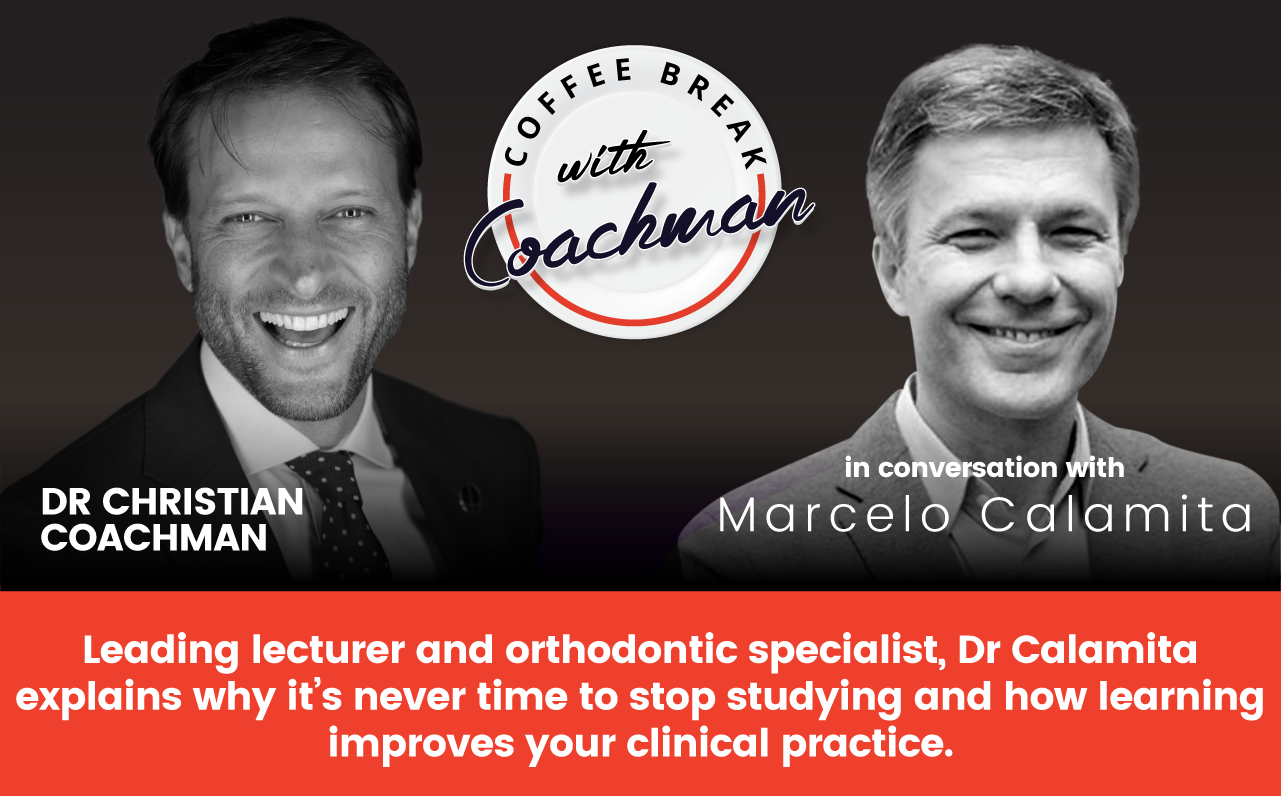
What follows is an interview with my dear brother in dentistry and my mentor, Professor Marcelo Calamita, who has been my partner ever since. We have been working together for 25 years and as I tell the whole world, he is the best orthodontist that I know, even though I work with some of the best. I'm super-proud to work with him, to research with him, to publish with him and to lecture with him. Also for me, this interview is an opportunity to share with everybody just some of the insights that I learned from Marcelo.
This interview was originally taken from Coffee Break With Coachman, a series of interviews with the best brains and the best personalities, in short, the most influential people in our dental industry. From business to marketing to clinical to research, academics, laboratory technology and digital, each of the interviews is a conversation with a thought leader in their field, sharing their knowledge and experiences.
CHRISTIAN: I wanted to start with a quick introduction from you so the ones that don't know you get to know you, who you are, your background, what do you do, your academic background. Who is Marcelo Calamita?
MARCELO: I am a prosthodontist in Sao Paulo, Brazil. I graduated 30 years ago and also I did my Masters and my doctoral program at the same university - the University of Sao Paulo. Since then, it’s been 30 years of studying hard almost every day. Now I work in different projects, not only in lecturing but also trying to write something to bring into textbooks some of our great ideas, knowledge and some reviews of the literature I think will make the difference for dentists.
CHRISTIAN: You mentioned 30 years already in dentistry. That's many years treating teeth, restoring and rehabilitating people’s smiles. What were your initial dreams when you started to think about becoming a dentist? I know you don't have a dental family, like many in dentistry. So why dentistry? What were your initial ideas about this profession?
MARCELO: I started from scratch and I started in a small office but I always knew I wanted to build something great.
My idea from the beginning was to be the best that I can be. I wake up every day, trying to improve myself in every detail of my personal life and my professional life. I think we all have to make the time to strive and to search.
I call the first phase of our professional life time to survive. It's a period where you have to learn to invest the little money that you make into knowledge, materials, equipment and always trying to work with the best technicians, because we also learn a lot from the dental technicians. Christian, you were one of my dental technicians and I learnt a lot from and with you. We have to have a great interaction with our dental technicians because it can teach us a lot.
CHRISTIAN: Going back further, when did you decide to go through dental school? How old were you? Why? Tell us why you picked dentistry.
MARCELO: I always liked medical science, but to be a doctor at that time I was pretty young. I thought I should invest a lot of my time because I had an uncle at that time who was a doctor. This uncle didn't have time for his family. He was always out of his house, working until late at night, working on holidays.
I used to see this and at that time, I didn't think it was a good thing for the balance of life. So as I liked medical science, I chose dentistry because I thought I could manage my time better.
I thought at the time, I could choose the best thing to have freedom of schedule and freedom of time.
You know, that it's not exactly how it’s worked out! Today I am slave of my office, I do work until late at night. But I don't feel that I'm working until late at night. It's doing the thing I like most and it's not exactly work. But I do work very hard, around 10 to 12 hours per day seeing patients.
CHRISTIAN: But do you still have that sense, you still have that feeling, that you own your schedule? Even though you have to work many hours a day, you know somehow that whenever you want to give yourself a break you can, whenever you want the day off you can have a day off. So somehow this freedom gives us this perception of control of the schedule, right?
MARCELO: Exactly, exactly. Sometimes the patient comes and says, "I need this work done, you have to make this finish by this date." So sometimes, we can’t always take time off when we want. But most of the time we can control our time, yes, you are right.
CHRISTIAN: And during dental school, it's always a period where I think when you enroll into dental school you have one perception of how it will be, but as you go through dental school you start to realize other things for better, or for worse. During dental school did you have any doubt about the profession you picked? Or did you just, year after year, as you got more involved, get more passionate about it? How was the dental school period?
MARCELO: Before going to dental school I went into the pharmaceutical side and I wasn't happy with this school. And so after going to pharmaceutical side, I choose dentistry. To be sincere I liked dentistry from the beginning. From the first class, I think it was maybe anatomy, I thought ... ‘I like this a lot’ and I thought at that time, "I think I'm going to like this career."
Of course you have some disciplines that you don't like so much, especially the basic ones. But from the beginning, and during university, I liked it more and more, being at the school. At that time I wasn't a brilliant student because I always was very focused. So although I liked sport at that time, and I liked of course to have some spare time for me - I was always very focused in the most important things that I could learn from the university.
When I really started to love it was when I got in touch with the prosthodontics, with fixed prosthodontics at that time. I remember the very first lectures and I thought I love this.
CHRISTIAN: For me the first two or three years were a nightmare with all those basic scientific disciplines.
MARCELO: Biochemistry, histology, microbiology.
CHRISTIAN: All these ologies didn't make sense at all, it was very tough for me. But I can see that you were much more biologically driven from the beginning and that made dentistry much more related to your dreams. Did you have any really good teachers during dental school? You had mentors at that time. Who were your mentors in dental school and right after finishing dental school?
MARCELO: Mentors that teach you a lot, especially in the area that you like, are the ones you remember. For example in prosthodontics, I have one that I remember a lot, his name is Silas. When I graduated, the first rehabilitation that I did in my office, when the patient finished their rehabilitation, I cemented the case and I cemented the trunk. It was a high static, it was something like 10 units spread, 10 units bridge. After the cementation I realized that something was wrong. I called Silas straight away.
He answered and said,
"Marcelo, prosthodontics is the art of redoing things. So get used to it, you are not the first one but don't worry."
So my first big case, I had to redo in a couple of weeks because I had cemented it wrong. Can you believe it? I cemented a rehabilitation wrong and I had to redo it.
All the department of prosthodontics at that time were also great. I had a lot of mentors people like Mori, Lupi, Fernando, Claudio Sadiq and others that helped me a lot. Especially in the first years when I was doing my fellowship, my specialization course and Masters and doctorate. They helped me a lot.
CHRISTIAN: And as soon as you finished dental school, of course today we know that as soon as we graduate nothing is clear. We know that we can pursue an academic path, we can pursue a clinical path and today even pursue a business path in dentistry. As soon as you graduated, did you know you wanted to become a teacher as well? Or you were just focused on becoming a great clinician? How much of business did you know at that time? Did you have any clue about how to run your clinic from a business perspective or did you just start as a clinician and learn as you went?
MARCELO: At that time we lived in a very romantic time of dentistry. My dream was to be a great clinician - to learn, to be able to do great rehabilitations and full mouth rehabilitations. So that's why I knew I had to study. I studied a lot to be able to do that. But I thought at the time that being a teacher, I could improve my skills, by being a professor. And that's right, because when you study to be a professor, when you are able to transmit your knowledge, you learn much more when you are a professor.
CHRISTIAN: I usually say that when you try to teach something that's when you realize how much you don't know about it! And when you are able to combine that knowledge you learn a lot just by trying to be a teacher.
MARCELO: Exactly. That's right.
I think when you started to share your knowledge, you have to go deeper into the subject and then you learn much more.
I think together, being a professor and also in clinical practice, is a great combination. But in the beginning, I realized in order to be as successful, in terms of money, I also had to run a successful office.
So of course I started in a small office but thinking big. We start in small offices but you have to build a great network of colleagues and patients, and you have to develop different skills, such as empathy.
CHRISTIAN: You were always very pragmatic and down-to-earth, so financially, you were a very solid guy. I mean you were always very organized, and probably you can confirm that you started by looking for information about how to manage financially the basics, right?
MARCELO: Exactly.
CHRISTIAN: So, how to manage business properly. But do you think that at that time you knew exactly what you wanted, where you wanted to be in 5 or 10 years? Did you have strategies, I mean business strategies, or were you just seeing one patient after the other and thinking let's see where it takes me?
MARCELO: It was 1988 so in Brazil we didn't have enough education about marketing strategies. But I started reading books from the United States, one that I think it was great at that time. It was written by Linda Miles, it's called Practice Dynamics, with very good tips about how to run a practice, how to make plans and how to accomplish these plans. So from the beginning, reading not only these kinds of books but also books about neurolinguistics.
Actually you have to write your plans down, and you have to, every year, you have to read the plans that you wrote down and to check if you are heading the right direction.
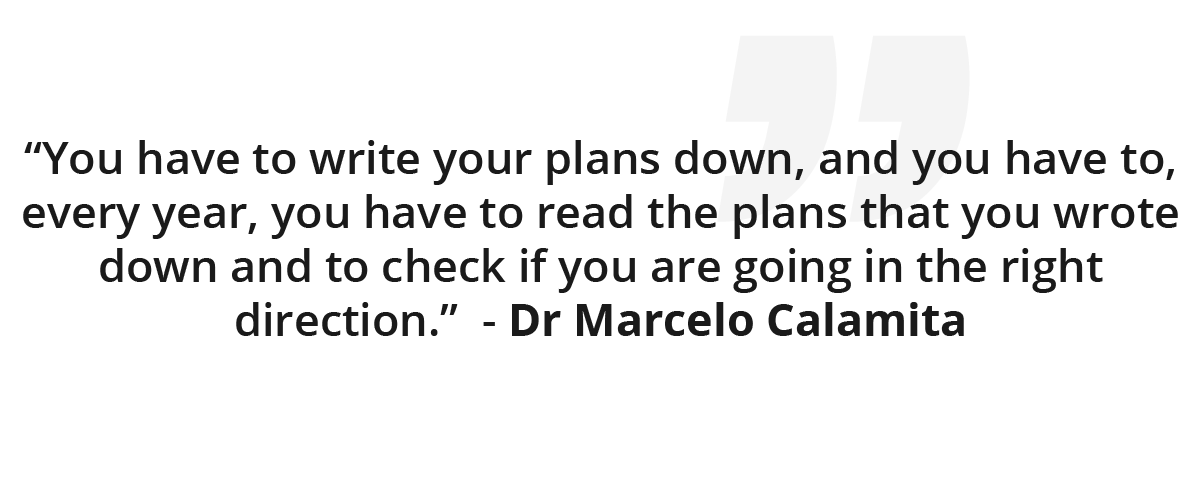
But since the beginning, over 30 years ago, I wrote down my plans and I used to check every year, every five years, if I was in the right place. I was surprised to see that I was always better than I initially planned in terms of my professional career and also in terms of money.
CHRISTIAN: I would say that you were ahead of the curve there as a young dentist, investing in preparing your career from a business perspective. I think today everybody knows about that but 30 years ago that was something very unique, preparing yourself to succeed.
The other thing that was very interesting as we grew together, me as a technician, you as a dentist, I remember that we started to lecture together right at the beginning more as fun, right? As something good for our ego, something that was a lot of pleasure to be able to share a little bit of what we were doing, even though we were just starting. And then as things started to evolve and your office really took off and my career went upwards.
I was moving to Atlanta and then lecturing became very strong, and I remember a certain period where you came to me and you said,
"You know Christian, I really don't have time to lecture anymore. We've been doing this together, I'm going to have to slow down. My office is growing, this is where my money comes from. I really need to focus on this."
And that's when our careers kind of deviated a little bit, where I went full power on lecturing and you went full power on running your office, even though you always had the teacher inside of you.
And then more recently, I remember, maybe I don't know, five years ago, when you were already at the top of your career as a professional, as a clinician, with an amazing office that was very profitable. You came to me and said,
"You know Christian, I need a break sometimes. I want to invest a little bit on my lecturing career again. Any time you see a possibility just connect me, bring me back to the circuit."
I think that's a beautiful thing to break the monotony of daily dental work in between four walls, every day doing the same thing.
What do you think? Do you think you've got a balance now, and what is this balance for you between a profitable, clinical career and a successful career as an international speaker?
MARCELO: You know, actually we discussed that with our friends, who are speakers, because it's very difficult to balance. Some of them, very successful in terms of speaking, who are speaking everywhere but sometimes they miss the balance and it's always not good.
This is not good for you, not good for your health. So it depends on your time. I think when my kids were pretty young, they need me to be close to them. Nowadays they’re grown up so I have more time because if I'm not at home it’s not a big problem. So it depends on the time of your life.
But inside of me I always have felt that I have a secret that I need to share because when I share the things I force myself to study, I force myself to improve myself. So that's very important for me, because my life in the office can also be very monotonous. Every day is the same, even when you do very big case, rehabilitations, after 30 years all the rehabilitations are even. So I know how I'm going to start, I know how I'm going to finish, I know how much time I'm going to take.
So that's why when you travel, when you meet people, when you get together, when you exchange ideas, it’s very, very nice.
And the good thing is, you know when we're together, we get very nervous before the lecture, when we are preparing the lecture. But after the lecture, when you see that the people like it, when you see that you’re helping them, that you're good at something -
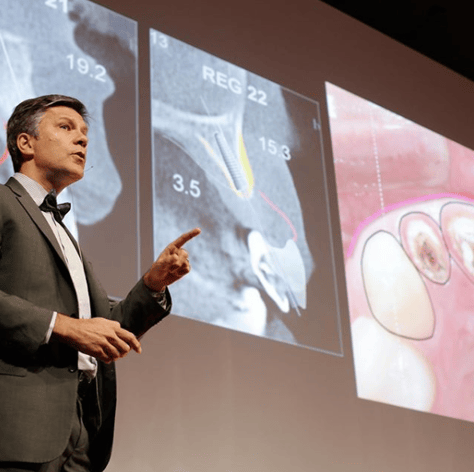
CHRISTIAN: It's re-energizing for sure. You come back to work on real patients with much more energy and more proud of what you're doing. Since I always appreciate your insights when it comes to how to find balanced solutions, what do you think is a good balance for you? And I see that you're working in your office, how many days a week, how many hours? How much time are you able to spend with your family for a weekend and how many weekends per month do you actually accept lecturing and travel?
MARCELO: I refuse some lectures during the year because I try to travel just one weekend per month. And sometimes, depending on the event, depending on the meeting, two times per month. Usually I give one course per month, like the course we run from Thursday to Saturday and one lecture per month. Usually I separate 20 days per month to my office and 10 days because I have to travel and then lecture and then give a course. So 20 to 22 days per month in the office and eight to 10 days traveling and lecturing. This is my balance nowadays.
CHRISTIAN: And your wife is happy with that structure today?
MARCELO: Actually I'm at this level in my personal and professional life because my wife supports me a lot. She's very kind and she understands that it's good for me. So when I try to quit, she tells me, "No, this is important for you. We understand of course," I try to make a balance when I'm at home. I try to be with her and with my family. Every weekend we are together. But it's very important for you to have support in your personal life with your wife, and for women the husband is so important.
CHRISTIAN: I know your wife very well. I know she's really, really supportive and special and gives you the whole structure for you to pursue what you need. It's great when a partner can understand the fact that you're traveling to re-energize and to share, to learn, come back and be able to produce.
The toughest moments in your life, I would say, when you look back, managing a big, successful career now with traveling, with the moments now that you've achieved now the kids are grown up. You have the moments that everybody goes through when you're already kind of successful but the kids are very small and you're starting to relax a little bit but you have this responsibility to make more money.
You have also the moment of survival you mentioned right after dental school when you have nothing to lose but you have to put in many hours to put to create something.
From all of these moments, do you think that today you are able to have more free time for yourself? Because some people make more money, it's different. Some people make much more money today, but they somehow have less time for themselves.
MARCELO: At the time when I was doing the Masters for example I didn't have time. But nowadays my time is more scarce. I have less and less time, especially because nowadays together we write articles, we give some lectures and nowadays someone is always inviting me to something else. So my time is very short, because I have time to write late at night or Sunday or Friday, or Saturday or very early in the morning. So that's why I don't have too much time nowadays.
CHRISTIAN: That's exactly why I asked, because as we get older theoretically we are getting more successful, so we are getting more money but we are not having more time. And that's a challenge that we need to face. As success happens and grows, I see many, many people actually having problems on improving their quality of living. Success comes with less quality of living. So the word success is actually relative.
As we see certain moments in our career, I remember for example when I was an employee making very average money, nothing at all. And I had an amazing quality of living, almost no extra responsibilities, very little stress, doing decent work but in a very stable, balanced life. And I compare to today, sometimes I see people like us losing themselves and not actually improving quality of living.
MARCELO: If you like whatever you are doing, if you think that you are improving yourself, that you are making progress in your life, I mean, in all sense of life, I think it's good for you.
Even when you are tired, even you are overwhelmed with a lot of responsibilities, that's why when people look for you and invite you to be part of some teams, to be part of some commissions, to be part of some boards, it's very hard to say no. And so you accept it and it brings more work for you. But when you like the work … of course you have to be organized, you have to be disciplined. And if you are organized and disciplined you have time for everything. You know usually people that don't do anything don't have time. When you do more and more things you will always have more time. It's amazing to think about.
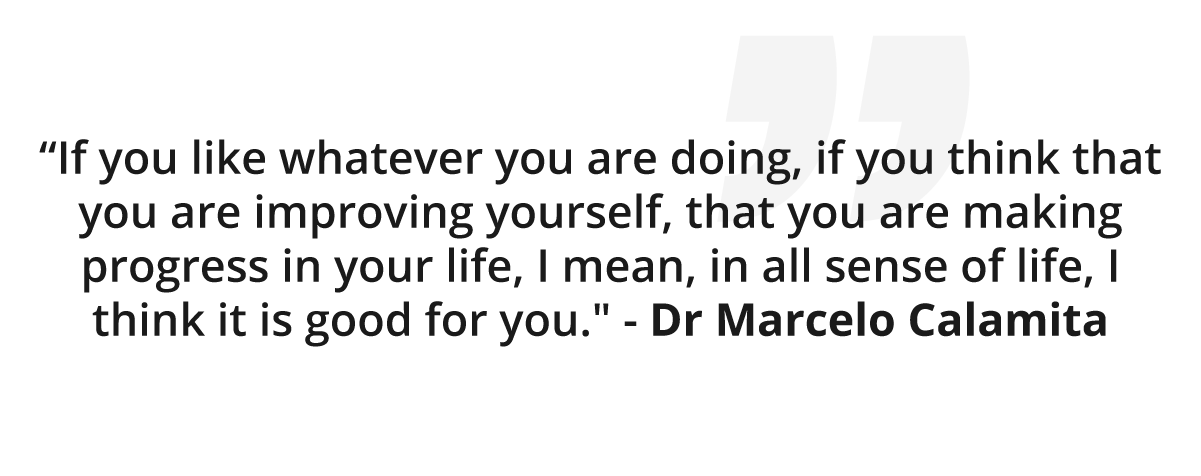
CHRISTIAN: I agree with you. If some of these tasks become hobbies, and many other hard things that we've been doing lately, it's not work anymore. It's a hobby. It's really a pleasure. So that helps on keeping the balance for sure.
Now, moving a little bit more to the clinical perspective, but also related to business. We know the dilemma is always delivering quality, caring for the details but at the same time being efficient and profitable. A dentist has a very challenging task because we are about healthcare, we take care of people. But at the same time we run a business.
We’re different than a physician that is working, for example for a hospital, and just taking care of people. We need to sell, we need to be profitable, we need to be efficient. So yes, you can do a crown 16 years in, in half an hour or you can crown 16 years in, in three hours, and this balance is always so challenging and is always a topic for discussion, you see people discussing the limits.
Right in between everything there's ethics and your principles. I know, I'm asking this because I know that you are extremely ethical and you are extremely good with your clinical procedures. But at the same time you're very pragmatic. You don't waste time with things that may look good on pictures just because they look good on pictures.
What are your thoughts on these two worlds that I call the lecturing world of fancy la la land things that don't matter with the real world and of taking care of people and making money?
MARCELO: You’ve known me for 25 years, as you said you were my dental technician. You know how I work. In the beginning, unfortunately, I lost a lot of cases. I didn't take pictures because I was at that time focused on practicing, on my clinics. That's why I lost a lot of good cases. But the problem is, you have to plan. You know that I plan a lot, every step. I'm trying to master every step of the process of doing a crown or doing a rehabilitation.
The word is being effective, being efficient. You have to know at which point you have to reach. Of course ethics, precision, for me it's making things that are going to be durable. But I don't waste my time with things I don't think aren’t necessary. Because today meetings are becoming more entertaining than actually educational. People show things that to my mind, are not critical. For example, of course you can discuss a lot of different things but people say in the meetings that rubber band is absolutely necessary.
I know from the literature a lot of papers say that it is fundamental and some papers don't say that. Of course the important thing just to mention is you have to control the moisture. Of course you cannot do adhesive dentistry in the middle of water or moisture or saliva. But for many cases, for example to bond veneers, you don't need to use a rubber band and cement one by one because it doesn't make any difference in the long-term.
I can tell you, I have cases from almost 20 years I did without a rubber band. Of course, good isolation, a good modified rubber band. But for me it doesn't make any difference. Before a clamp there are other things that people don't pay attention to, for example occlusive calibration - people don't restrain it, people don't dip into it and don't pay attention to it. It's just if you don't make a nice, perfect occlusive calibration, the crown or the rehabilitation simply won't last. To my mind this is the kind of thing that I think is important.
CHRISTIAN: I think there are two passions that we share in dentistry. I think one is treatment planning and the other one is occlusion. We've been studying it together since the beginning. You translated Peter Dawson's book to Portuguese, I think that needs to be mentioned. Your passion for treatment planning, does it come from Peter Dawson? From translating his book? Or is it just part of your character? It’s like you were born to be an engineer and then suddenly you became a dentist! Because I don't see many ... I've been a technician so I've worked with many dentists. At the beginning of my career, as a technician, I worked with average dentists and I got better. So I worked with everybody from A to Z and that's why I always mention a passion for treatment planning is a must and not many professionals invest necessary time to become good treatment planners.
As you always say, risk assessment, decision-making process. I love those two sentences. Where does your passion for treatment planning come from?
MARCELO: From the beginning, because you know that sometimes some words or some concepts, like DSD, the first time you brought that concept to me, I was the first one maybe... and when you brought it I told you it's good.
I said,
"It's good, let's write about that. Let's develop that," from the beginning because I'm very insightful. When I think that things that can make the difference, I believe and I support them. I was always like this. Since I was a child.
CHRISTIAN: Also for DSD, probably because you saw different than most of the people. Most of the people when we started with DSD saw designing smiles, making simulations. You saw making drawings to see better and by seeing better, making better decisions, and by making better decisions, making better treatment plans.
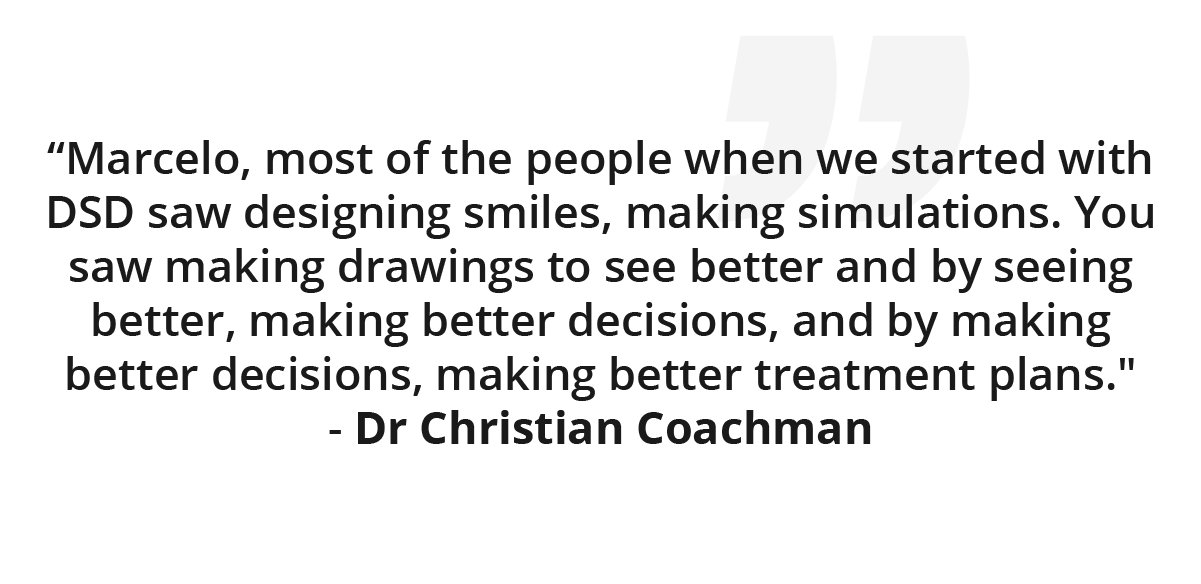
MARCELO: Exactly. And also as an educational tool for the patients, because doing those initial drawings means that the patient can understand from the beginning what we were suggesting and can discuss with us the best approaches from the beginning about the DSD.
CHRISTIAN: This was another thing, but communication, right? You were always into communication. I can say that maybe both of us were inspired a lot on this topic by my father and also the books from Banking and Rick Robey.
Both were very focused on trying to teach us that most of our problems are because of lack of communication. From the beginning you were always studying a lot about how to improve your communication skills with the technician, with the team and with the patient?
MARCELO: Exactly. So in the beginning, I was at the Department of Prosthodontics and I was very surprised and astonished to see how my mentors could plan a very complex case and very quickly. And from the beginning I thought, "I have to know that". Because this is the most important thing, when you look at the patient, like a complex case - removable prosthodontics, not fixed ones or implant prosthodontics. You know what to do, when to do, how to do it very quickly you can save time. You don't need to redo things, you can save your time and his time. So I learnt that from the beginning. And at that time it was the golden age of occlusion. So we had a good department of prosthodontics and occlusion and then it needed to be translated into Portuguese and this professor Silas, he got some people and a translation team to translate P. Dawson's book into Portuguese. It was in 1990 - a long time ago.
Actually one of the most comprehensive books ever written. Amazing. But Christian, go and read more. You have to read more than this. Usually people that read P. Dawson book and think that is enough. It's not enough. You have to read more, you have to read Oakson, you have to go into Frank Speers and others. So there is a lot of good references there in the field of occlusion. Not only P. Dawson's but a lot of good references.
CHRISTIAN: Sure. If you could summarize trying to think that you are not yourself and you're looking at Marcelo Calamita as the dentist, what are the main strengths clinically and psychologically of Marcelo Calamita the doctor? And what are his weaknesses?
MARCELO: It's hard to say that. Well you know, my main strength as well was being very focused and disciplined is when I don't know something that I study it, and I go hard. I look at people that know so I can cross the ocean and go to the people that can give me the right answers. That's important. Who can give me the right answers?
.png?width=1201&name=Blog%20Post%20-%20Quote-%20%20Dr%20Marcelo%20Calamita%20_04%20(1).png) CHRISTIAN: I remember how much you studied from the beginning, I’ve watched your whole career and I was always thinking, "One day he's going to slow down on studying," and you never did.
CHRISTIAN: I remember how much you studied from the beginning, I’ve watched your whole career and I was always thinking, "One day he's going to slow down on studying," and you never did.
MARCELO:
Actually, nowadays I'm worse than ever. I study more than ever because I'm doing a very comprehensive review about the topics I'm supposed to know. So I'm studying hard more than ever.
CHRISTIAN: I want to take advantage, Marcelo, and say that you are writing a book. Everybody will be anxiously waiting for this book that hopefully will come out. Actually both of us are committing to this so we are already extremely busy and now we are committing to writing a book that is a full-time job for the next 12 months. It's going to be crazy but we have an article coming out and we had the honor to have John Coise on this article. There's going to be a little preview of your amazing book, but definitely organizing thoughts and focusing is one of your strengths. Weaknesses?
MARCELO: Yes, weaknesses. I'm working trying to improve my weaknesses like being impatient. I explain very well and people who are around me, they know how I work so I try but when I have to explain second time, a third time that I'm very impatient.
CHRISTIAN: I remember a story because you used to work for my father at the beginning in his office, you were the prosthodontist of our clinic. I was just a student at that time. And I remember my father coming to me and saying,
"We have a new prosthodontist in the team. He's amazing, but he's not really good with people. He has no patience, he explodes."
I remember several years afterwards, 5, 10 years after saying,
"You know, I was super impatient with people. I realized that, I focused on getting better, and today patients actually like me. Even the bad ones, even the tough ones I'm able to bring them back, to settle them down and to go around the problem and bring them back to my side."
I remember you telling me that.
MARCELO: Yes, I've changed a lot because I recognize that empathy, leadership, all these kind of things make all the difference. I learned a lot from your father, Robert Coachman. He was a great guy in these kind of personality traits.
Actually I try to improve myself in everything that I think is not good and this kind of impatience I think was not good for me at that time. But nowadays I'm much better, I think it makes a huge difference in terms of personality and relationships.
And I learned a lot also from my wife. She is so kind, she taught me so many good things and she was a great person in it.
I learn a lot with my kids, because when you have kids and you see their difficulties on simple things that you didn't have when you were a kid, for example, and you feel that you have to be different, you have to be more patient. It is amazing.
CHRISTIAN: Accepting the difference, accepting different skills and different challenges that people have - that's definitely with the kids that you learn a lot.
Another thing that I want to ask you, since I also learned a lot from you when we were going to conferences. Dentists, they love to go to conferences, we watch a lot of hours of lectures from others.
We know that the key is to have a very good filter when you're listening because the information is so big and if you combine with internet and with everything that you can reach today, the problem is not accessing the information but is filtering the information, finding what really matters.
I remember a process that you always did when we were going to conferences. You would make notes of all the lectures and you would sum those notes. It didn't matter how good or bad the lecture was, you were like,
"If I'm here sitting and I'm watching I'm going to take advantage of this. I'm going to watch this guy, I'm going to take notes, I'm going to ask if needed, and then I'm going to compare the information that he gave me with the information that I have.
"I'm going to cross this information, I'm going to question this information, I'm going to summarize this information, I'm going to make a conclusion out of this. I'm going to take home something."
If you could give a strategy, or advice for young dentists or even all dentists that are going to meetings - how do you organize yourself to take the best out of conferences and lectures?
MARCELO: You summarize it very well. But first of all, when I go to the meeting, when I go to the course first, I like to know who are going to be the speakers?
I'm not going to the meeting because it's in a nice venue, in a nice country, a nice city. It's only because the people that are going to speak there. I know their strengths, I know what can I learn from every one of these teachers. So that's important to know, maybe research, if it's a good clinical or if it's a good researcher, these kind of things.
When you are there, one very important thing is if you don't take notes research shows that you only retain 20 to 30% of the information. That is not good because some of this information you are not ready to keep with you.
Maybe in the time of your life a good piece of information was given and you're not ready to understand. That's why it's so important for you to take notes and sometimes later, I mean, it can be hours after or it can be days or it can be years. When you take a look at that piece of information that you wrote down and say, "Wow, it was there five years ago."
CHRISTIAN: I remember us going back to your notes of conferences like five years before and we were talking about something and you were like, "I remember this. Somebody said something."
You went back to the computer, you found the notes, the summary and then we brought into the discussion extremely useful. So that’s really, really amazing. That's why we called you Marcelo the Dental Encyclopedia.
MARCELO: It’s systematic, step-by-step. That's why I take notes, I rewrite the notes and I check if the line of thought is okay.
That's why you know that when we give lectures I try to make a very nice line of thought to be understandable to people, especially with very hard topics, like about occlusion and treatment planning. Because I streamline my line of thoughts, learning with others all this time.
CHRISTIAN: That's why you're a good teacher. It's a specific skill that not everybody has. Being a great clinician is completely different to being a great teacher and you are one of the few that I know that can combine both for real. There's very, very few real teachers around, people that can actually understand the thinking process and organize this.
Showing off with beautiful cases is great, but that's not being a great teacher or being a real teacher. So you were able to organize your thoughts in a way that you can teach them, and that's the beauty because when you try to understand the way you think, you then are able to teach others. You know why you think that way and you can break down your thinking process into steps. You always work like that, creating steps in even your notes and your procedures and then being able to share those steps with people.
We are talking about going to conferences and last year you were the President of the Brazilian Academy of Aesthetic Dentistry. I want to congratulate you again one more time for the amazing event you put together, making Brazilian dentistry even more respected outside.
I think that you made a transition and the conference that you organized last year will be forever in history as the moment where Brazil got the credit that we deserve. The event became at the same level as the best events in the world for sure and I hope that starting from that event from now on, this event will stay at that level.
What did you like the most? Because putting a conference together is like putting a lecture together. Everything needs to make sense - the speakers, the sequence, the topics, how you manage everything, even the party and the social events. Everything is part of a big story. This is what makes beautiful conferences.
What were the highlights do you think about how you put the conference together last year? What was your process of putting the conference together conceptually speaking? This may help people to evaluate which conferences should they go to. When you look at the conferences, how can people can see this is a good conferences, that it's well-organized and well thought out?
MARCELO: First of all, thank you for the kind words. I appreciate that. But you already said the right things about it. You have to have a story. First of all, I started from a topic, with the theme - being complete, as a clinician, as a person. So I tried to make a sequence of lectures, of activities that I think could add some important information, capabilities or competence.
So it’s not only clinical, not only technical but also business competence, also administration competence, and there's also psychological competence.
So you have to write a story and you have to invite the characters for that story. The best speakers in this topic that you think will make the difference. You'll of course have to know to be open to what's happening today and to invite very current topics, very important things that can make the business for now and for the future. That's why for example I invited your father to talk about the human part of the dentistry in the past, you to talk about dentistry and then people to talk about psychological aspects of marketing and social media.
The dentist cannot only think about technical part. The technical part is only one important competence, but you have to have many others. You have to know how to take pictures, you have to know how to manage your team. You have to know how to control, how to organize all your office, everything. That's why I wrote this story and then I invited people that could tell this story in the best way.
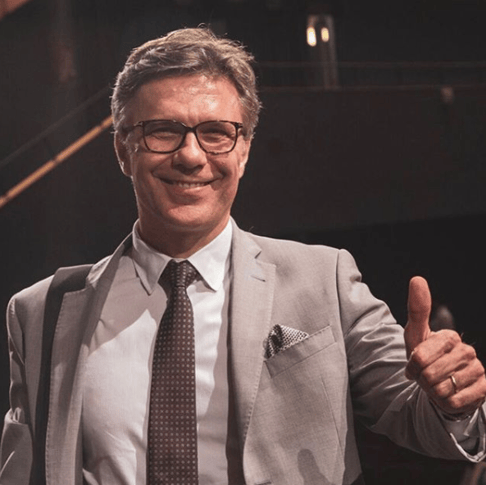
CHRISTIAN: Which meetings? If you could give a list of three or five meetings internationally that you think every dentist should try at least once, what would be your list of the top dental meetings?
MARCELO: Okay, in Brazil of course, the traditional Brazilian Society of Aesthetic Dentists that you'll be the President of in 2020. Congratulations for that. You deserve to represent the Brazilian dentists at the highest level, as you have been representing for almost 15 years already. I enjoy that a lot.
One conference I like to visit at the highest level is either the European Academy of Aesthetic Dentistry, American Academy of Aesthetic Dentistry, the Quintessence in Boston like international journal, very restorative dentistry in Boston. I recommend also John Coise's course, the John Coise Symposium.
You mentioned about mentors. We did have great mentors Christian, like we have to thank Eric Van Dooren, and others.
CHRISTIAN: And I want to finish with one final topical question. And that is, where do you see yourself in 10 years? Professionally speaking, let's say from five to 10 years. Do you have a very clear picture in your mind about where you want to be? What do you want to achieve? What are the next steps? Is there something left? How you want to be professionally, personally in 10 years?
MARCELO: One thing I really know, you say that I'm very successful but I'm not retired so I have to keep working. But the important thing, I don't see myself retired because I love what I do.
What is important for us, for me and probably for you is to keep being influential, to keep having ideas and to keep helping others to improve. I want to have the balance and also the mind and the outer criticism to know until what time I can help people. Because I don't see myself retired. Maybe I will reduce the number of patients that I see because it's very tiring. Even my back, my column, nowadays it's not the same.
CHRISTIAN: How many days a week do you want to work in five years? How many days a week do you want to work in the office?
MARCELO: Maybe three days working, lecturing more if I can because lecturing, I just give and it's a very good thing.
CHRISTIAN: What do you want for your office as a business? What do you see for your office? Is your office going to run without you? Do you plan on somebody taking over? Do you plan on selling your office to a big corporation? Are you bringing younger dentists to take over? Do you have a business plan, an exit plan, a business model for your office?
MARCELO: Yeah. My son is going to dentistry school, maybe he can help me in a couple of years. But if I didn't have any kids, like I have three, maybe one or two more can come to my office. I don't know, maybe one. Of course I would like to sell, or bring in good people to work here and then I'd work as a consultant like an administrator doing the treatment plans and talking to the patients and recommending the best things.
I think this is the future Christian. Dentists need treatment planners.
You mentioned a very important thing because the machines can make the technical part but the brain, you cannot replace the brain.
I hope you enjoyed this interview with Dr Marcelo Calamita and were inspired, as I was, to continue to learn and grow as a dentist. If you would like to know more about Digital Smile Design and the courses we offer, including our four day residency to take the first step to becoming a DSD Master, find out more here:


